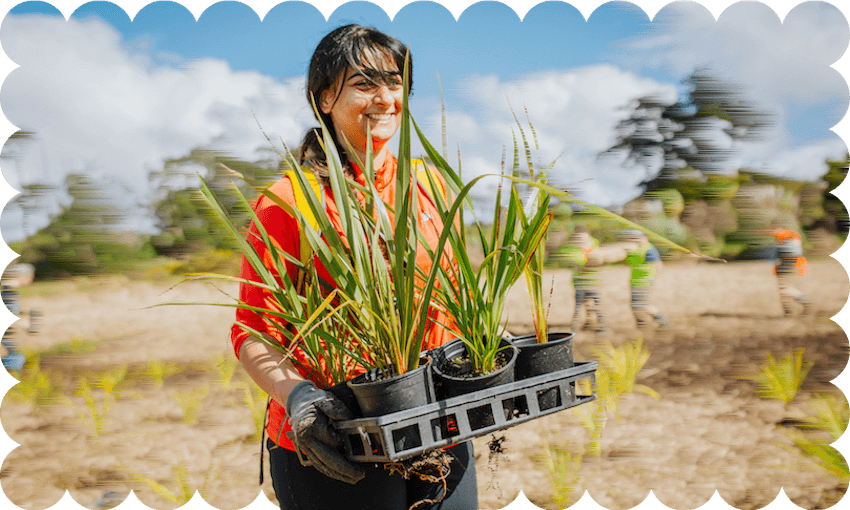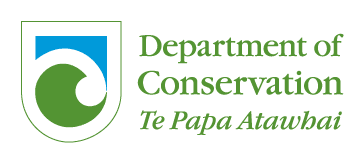Taking action for nature is good for the planet and for our own wellbeing. DoC has created a guide to small individual actions that can help make a big difference for the environment.
I’m what my colleagues fondly refer to as “outdoorsy”. For me, nothing beats the thrill of an empty weekend, great forecast and a map full of possibilities. In the weekends you can find me in the mountains – any mountain. Or, at a pinch, a small hill.
After university I got an internship at the Department of Conservation, Te Papa Atawhai, and it was a dream. I’ve stayed, working various roles there ever since. I’m lucky to be working every day for the benefit of the environment and helping people embrace and engage with it.
This year, I had the task of leading Conservation Week for DoC. The week was focused on how our personal wellbeing and the wellbeing of the natural environment are connected. It’s a role I really wanted because the task is to get people 18-30, like me, in urban areas, like me, into nature. There were more than 80 events around the country, multiple groups involved, countless actions, activities and opportunities, and lots of eyes on us.
From September 5-11, Conservation Week Te Wiki Tiaki Ao Tūroa asked New Zealanders to “take a moment to act for nature”. We wanted to inspire Aotearoa to do something for the environment and conservation – because taking action not only benefits nature, but us as well.
And it doesn’t have to be hard things. It’s as simple as adding a native to your indoor pot plant collection, picking up rubbish around your community, participating in citizen science or volunteering.
The challenge is to get people who are objectively keen on nature to take the next step and do things in it. We want to ease people from the first stage, awareness, to seriously contemplating the problem and then acting. More simply: we want people to make time to do stuff for nature.
It starts with people actually noticing the issues. When you say things like “Picking up rubbish is good!” people respond with “Yeah. Obviously.” But then they don’t actually pick up the rubbish. It’s a legitimate psychological thing: unless you’re looking for it or attuned to it, it’s easy to miss. So what we’re doing this Conservation Week is setting a challenge for people to notice this stuff and then do something about it.
I went out with a colleague and a friend and their bike to take these photos for Conservation Week. We headed out to the Port Hills in Ōtautahi Christchurch with mixed hopes: I needed rubbish for the photos I wanted to take, but I was desperately hoping I wouldn’t find any.
Sadly, it didn’t take long for us to find rubbish lying around in the tussocks. It’s easy to spot when you’re looking for it.
This made me reflect on how many times I’ve biked that track or walked these hills and just not seen rubbish lying there. So I’ve set myself a personal goal to make sure I have a small bum bag or backpack whenever I’m in the hills, so I can actively look for rubbish to collect on my ride or walk.
And that’s what we want you to do – take a moment to make a conscious effort to make small changes to your world for the benefit of the te taiao. Because it’s those small things that together as a community add up to make a big difference for our world. Set some goals this week – and keep going throughout the year.
See how much rubbish you can get on a walk, bike or a run (this is my goal). Volunteer with a local club or organisation – for example, Friends of Ōtukaikino in Ōtautahi always need more people to help with planting at one of the last remaining wetlands in Christchurch. You could add some natives to your indoor pot plant collection; growing native plants is a great way to become familiar with the native biodiversity we have in Aotearoa. Or make a digital nature connection – and essential scientific contribution – through citizen science projects that rely on everyday people to contribute to the research. Projects like Spyfish Aotearoa need our support to identify and count fish species from marine reserves across the country, from the comfort of their computer.
We’ve outlined heaps of great ways to engage with the environment. They’re designed to be straightforward and easy to access but with real impact. Taking action will be good for you, and good for nature.
Ka ora te whenua, ka ora te tangata – when the land is well, the people are well. When Papatūānuku thrives, we all thrive.


